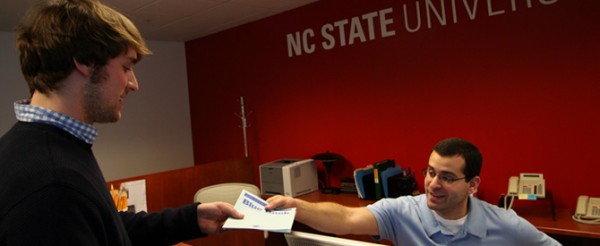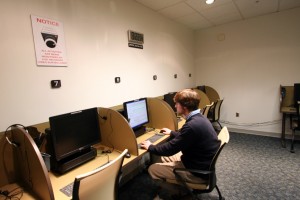Testing Services Experiences Unprecedented Demand

Not many people like to hear the words “more tests.” For students, these words mean more all-nighters, cramped hands, and waiting anxiously for grades. For instructors, these words mean grading even more 50-question, five-page tests filled with barely-legible responses.
But for DELTA Testing Services, “more tests” means an exciting opportunity to implement innovative technology to streamline testing efficiency and meet increasing demands from both instructors and students. In fact, Testing Services is proctoring more tests than ever, over 35,000 distance education tests since 2007.
In spring 2009, DELTA proctored 4,701 local and remote tests. In fall 2009, that number increased more than 60% to 7,587 tests. In 2010, Assistant Director of DE Testing Services John Pugh expects DELTA to proctor over 24,000 tests.
“There is about a 25% increase in proctored tests each semester,” Pugh said. “We have a total capacity of 175 to 200 people per day, and about 300 people per day during finals week.”
The growth in testing services mirrors the annual growth rate of distance education enrollments, according to DELTA Associate Vice Provost of Distance Education Rebecca Swanson.
“We typically experience annual growth rates in excess of 20%, a corollary of new courses and degrees available through distance education,” Swanson said. “Another factor is the economic context. Particularly during economic downturns distance education is an attractive option for students to acquire new skills or prepare for a new career.”
Instructors are also increasingly using DELTA’s secure testing services that require student authentication in closely-monitored facilities, greatly reducing the likelihood of unauthorized assistance in taking tests, according to Swanson.
Advantages of Online Testing
The advantages of online DELTA-proctored testing seem to be too great for instructors to pass up, evidenced by a 30% increase in online testing versus traditional paper-based testing since 2007.
“[Tests we proctored] used to be 40% online tests, but now we’re up to 70% online tests. It’s increasing all the time. Generally, instructors will try an online test once and get hooked,” Pugh said.
Students can take tests in any Learning Management System (LMS) such as Moodle, Vista, or WebAssign. Instructors and students both like that grading can be automatic and instant for multiple-choice, true-or-false, and other selection-based testing. For instructors, this cuts out hours spent on grading; for students, this cuts out days of waiting to get grades back.
“I find it easier to update the exams and the [LMS] can grade multiple-choice questions, freeing me to concentrate on essays and short answer questions,” said Dr. James Mickle, associate professor of Plant Biology at NC State. “This allows me to get exam scores back more quickly.”
Students benefit from online tests because students can type and edit much faster than they can write and erase. Instructors also benefit from the typed responses, which are easier to read than hand-written responses.

“[The most difficult thing about hard-copy tests is] reading student’s handwriting! Believe it or not, turning the pages adds a great deal of time to grading the exam,” Mickle said.
Students can manage their time more easily as well.
“I like online testing better because you can go step-by-step and have your options right there in front of you,” said Kevin Coyle, a junior in Fisheries and Wildlife Science. “Also, it’s got the time remaining right there on the screen that you’re looking at.”
DELTA’s implementation of an online scheduling system is also helpful for instructors and students. Instructors typically provide a window of at least two days for each test so that students can schedule the most suitable time.
Instructors no longer have to find a time and place for an entire class to come to campus nor do they even need to attend the test, but can allow students to take the test at their convenience at the Testing Services Center.
Security and Integrity
DELTA’s proctoring methods extend past making tests easier to take and score. DELTA has implemented technology to assure instructors that their students are practicing academic integrity.
Whereas traditional tests are static paper copies, online tests are dynamic electronic forms with built-in security. Students taking traditional tests can memorize the order of answers or copy off their neighbor’s paper. However, online DELTA-proctored tests have anti-cheating measures built into the software: question order and answer order can be randomized for each student.
It can also be difficult for instructors to monitor all of their students at once. However, DELTA provides approximately one proctor for every 15 students, monitoring students using four security cameras in eac h room capable of capturing text on any computer in the testing rooms.
“We closely monitor all online tests,” Pugh said. “When a student comes in, we can see every computer and what’s going on. We can take control of the computer, so if someone tries to pull up Wikipedia, we can take a screenshot and record their actions,” Pugh said.
DELTA also provides proctors for students taking remote tests. For students who live more than 50 miles away from NC State, Pugh implemented a remote proctoring system where students log in and choose from over 200 proctors at locations all over the world. Students may also nominate a remote proctor. Typically this is a faculty member or librarian, or someone from another testing center nearby.
To further increase efficiency for remote test-taking, DELTA has implemented a fax-to-PDF system for remote students taking traditional paper tests. Proctors fax the completed test to DELTA, which is then automatically converted to a PDF file, electronically backed up, and made available for the professor to pick up.
Testing Services Center Redesign
For local students, the DELTA Testing Services Center in Venture II on NC State’s Centennial Campus was redesigned in February to streamline efficiency in accommodating up to 200 students each day.

The Testing Services Center redesign is a minor part of streamlining the front end of proctoring, according to Pugh. Students now have a communal study area to review their notes before tests, and lockers have been moved into the lobby so that staff can see students storing and retrieving materials in lockers as they proctor tests.
“We re-used most of the existing furniture. We removed the lockers from the hallway and put them in [the lobby] to reduce traffic congestion,” Pugh said.
Since relocating to the Venture II building in 2008, DELTA has also increased workstations from 12 to 36 and added multiple overflow rooms.
“I think the atmosphere in here is much more relaxed than going to campus for DE tests. It allows you to focus better on what you’re doing,” Coyle said.
Learn more about DELTA Testing Services.
deproctor@ncsu.edu
Phone: (919) 513-1513 or
Toll Free: (866) 467-8283
920 Main Campus Drive
Venture II, Suite 500
NC State University
Raleigh, NC 27695-7113
- Categories:


